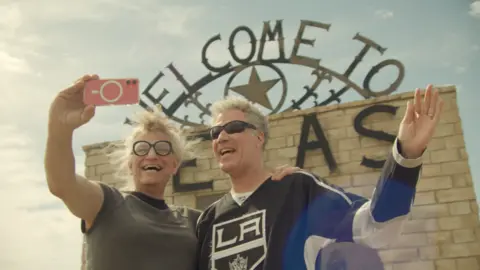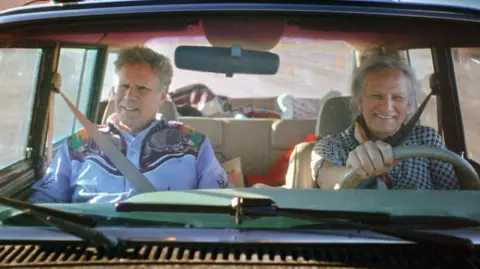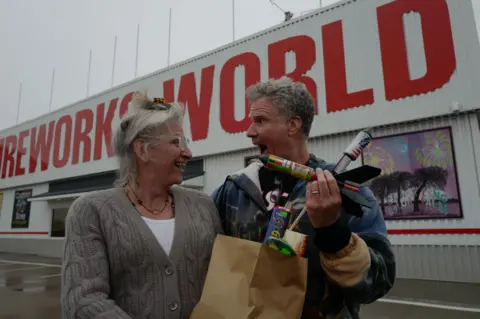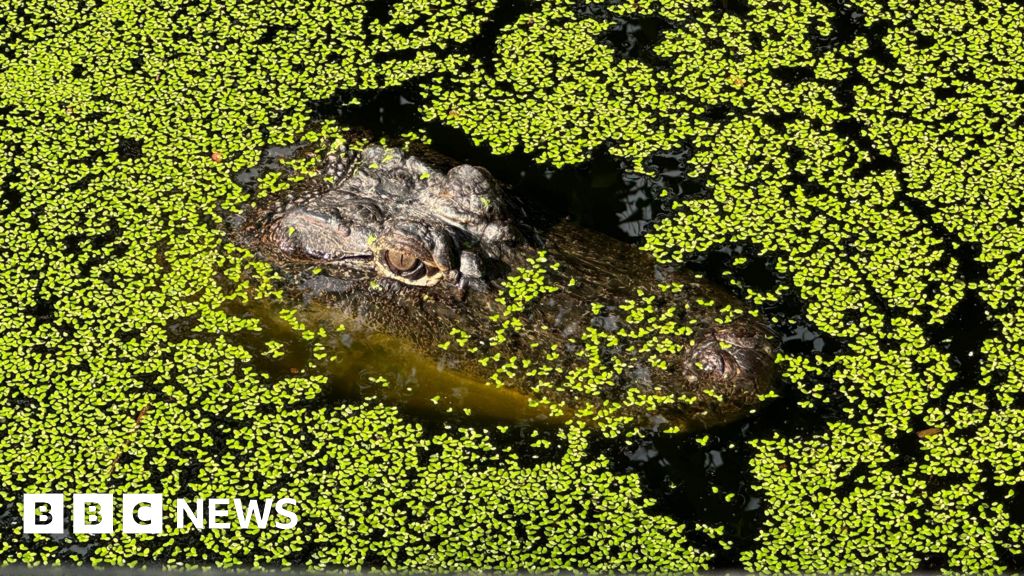How Will Ferrell became his trans friend’s road trip ally
 Netflix
NetflixWhen Hollywood star Will Ferrell received an email from his old friend Harper Steele a couple of years ago, telling him that she would be transitioning to live as a woman, he had many burning questions.
Will their friendship change? What made her keep this in for so long? And the biggie: “Does she still like rubbish beer or is she just totally into wine now?”
Will invited Harper on a road trip across the US so they could figure out “what this all means for us” and spend time hanging out at bars, diners and sports arenas – places Harper had always enjoyed going to before transitioning but wasn’t sure how welcome she would be now.
Their 16-day excursion from New York City to Santa Monica, California, is the subject of Josh Greenbaum’s new Netflix documentary Will & Harper.
Will tells the BBC he began to think more about how he could support Harper after she sent him a follow-up email announcing her name and asking him to “do your best to kind of stand up for me”.
“If I’m truly as good a friend as I think I am to her, I want to show her that [support] in what I hope will be a fun journey for us,” he explains.
“It was kind of earth-shattering news to receive. And I assumed it would feel roughly the same, in terms of our friendship. But I didn’t know for sure.
“Selfishly… I thought this could be a great opportunity for me to ask all these questions… and to give Harper the opportunity to educate me.”
 Netflix
NetflixThe pair met when they were both hired in the same week by US TV show Saturday Night Live back in 1995.
Harper went on to become chief writer and championed Will when some others at SNL didn’t feel he quite made the grade at first.
Harper says: “If it was just payback for me supporting him earlier, he would be done now. This [supporting her as a trans woman] is far and above what I gave to him.”
She had been on countless long car trips and loved the open road, but this was her first cross-country journey since transitioning.
“Yeah, it is daunting,” Harper says.
“And I do like to point out that my experience going across the country with a famous actor and a camera crew is quite different than a trans person going across the country solo.
“Also I have money. I can travel in a safer way. So there’s a lot there that doesn’t speak to a trans experience. Was I afraid of what I might find out there? Of course I was.”
In one scene, Harper enters an Oklahoma bar that looks potentially hostile. She wants to try it out on her own. Will is outside on standby. It’s mostly locals and there are pro-Trump and anti-Biden flags on the walls.
Will joins her, and when Harper is referred to as a man by someone on introduction, she corrects them firmly but kindly, backed up by Will. And the conversation moves on.
But as Harper notes, the cameras and the famous face offer some protection during such encounters – there are similar experiences at a racetrack and a basketball game. So did it ensure the people they met were on their best behaviour?
“I don’t really know,” says Will. “Yes, it’s an artificial environment for sure.
“At the same time, once people asked that initial question of, what are you doing here, what are you filming, it melts away and you do settle into conversing with these people in a way that I think would have existed if there weren’t cameras there.”
 Netflix
NetflixBut being in a goldfish bowl can also have the opposite effect, as demonstrated in a scene in a huge Texas steakhouse where the friends stop off for dinner.
Will dresses up randomly as Sherlock Holmes (the kind of buffoonery his fans adore) and attempts the 72oz steak challenge. But it starts to feel uncomfortable pretty quickly as crowds gather around them to watch his attempt and film it on their phones.
The film flashes up some derogatory social media comments towards Harper, and Will says he feels he has let her down.
The following day, the pair read some of the posts over a beer. “When you’re trans, you ingest a lot of that rubbish,” Harper says. “Those tweets sit in my head.”
 Netflix
NetflixHarper tells the BBC she’s “extremely conscious” of the toxicity around much of the transgender/gender debate.
“I think the politicians are pushing these things to try to get votes, and I think the press is leaping on it because polarisation somehow helps numbers.
“And I understand that there are people in their basements and people who are angry and they want to lash out. But on the whole, I believe people are kind, and letting a person live their truth should be everyone’s goal.”
While there are obviously some very heavy conversations in the film, there are plenty of hilarious moments as well (watch out for Dunkin’ Donuts), something its director was keen to showcase.
“I had 240 hours of footage!” Greenbaum says. “They are very funny people. Even in the deeper, more emotional conversations, they inherently, seven out of 10 times, would make a joke inside of those.
“Comedians are famous for using their comedy to mask real emotions, but obviously that fear went away very early on… I wasn’t sure to what degree they would open up… but they really go there.”
So does Harper still just drink rubbish beer?
“I don’t know if it’s the oestrogen,” she jokes, “but I do prefer wine now.”
Source link



